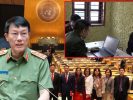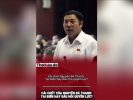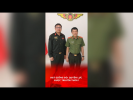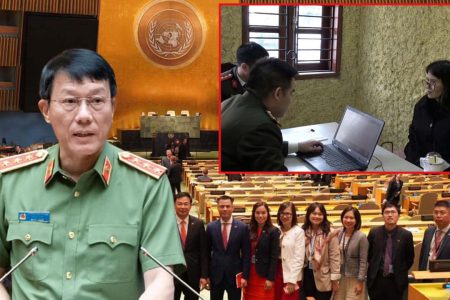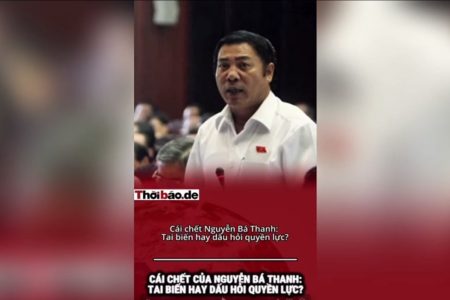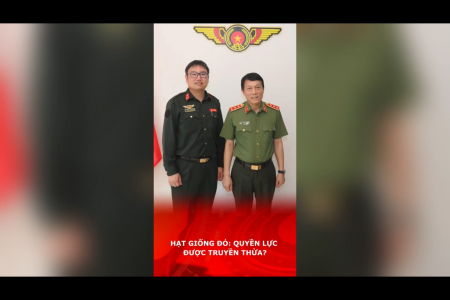Vietnamese political observers have shared with the BBC their thoughts on whether to keep the „special case“ over age 65 to remain in the 13th Politburo.
Normally, in Vietnamese politics, those Politburo members who are over 65 years of age, in order to stay, they need recommendation and approval of the Politburo and the Central Committee.

In the current Politburo, there are 7 people aged 66 and older: General Secretary cum President Nguyen Phu Trong, Prime Minister Nguyen Xuan Phuc, National Assembly’s Chairwoman Nguyen Thi Kim Ngan, Permanent Secretary Tran Quoc Vuong, Tong Thi Phong, Nguyen Thien Nhan, and Ngo Xuan Lich.
Sources so far told the BBC that the latest 12the Plenum of the Central Committee in May has yet to discuss how many „special cases“ in the Politburo could stay in the 13th term.
Earlier, sharing with the BBC on June 27, Dr. Pham Quy Tho, former head of the Department of Public Policy, Institute of Policy and Development, said if PM Nguyen Xuan Phuc stays, it would be a good thing.
„From my personal standpoint, I feel that PM Nguyen Xuan Phuc, along with other candidates, should benefit from age-appropriate migration criteria applied at the 13th Congress.“
‚Don’t go to age‚
Most recently, in the BBC’s Thursday discussion program on May 28, Dr. Nghiem Thuy Hang, Department of Chinese Studies, Hanoi National University, said that Chinese experience shows that age requirement should be strict and no exception.
„In China, I see no matter how good their leaders are, they still have to end their tenure, let other generations do it.
If they are good leaders, they can still work as advisers„
„The current situation in Vietnam, in my opinion, old leaders should go to give chances for young ones.“

“Human resources are very important for Vietnam”
And Dr. Hoang Ngoc Giao, from the Institute of Policy, Law and Development Studies in Hanoi, said that although he agreed with the principle of „growing bamboo shoots„, the current Vietnamese political context still needs flexibility.
„Human resources are very important for Vietnam. If there is still a pure, intelligent leader, then the country has hope.“
„A tendency to choose leaders, as Mr. Nguyen Phu Trong mentioned, is to select talented people, who are clean, not those who have many houses and great property.“
„But public opinion often says that everyone is with big assets, so who to choose? Now the criteria for choosing the General Secretary as set by the Politburo, with standards such as purity, uniting factors inside the party, then I pretend to say that only Mr. Trong is able to meet.“
Vietnam’s economy needs political stability
Mr. Hoang Ngoc Giao said he believed that the majority of people in Vietnam still supported General Secretary Nguyen Phu Trong to fight against corruption „although fighting against corruption is still facing many difficulties„.
„To stabilize the next steps, perhaps still need a leader, enough prestige in the people, clean, not entangled interest groups, then I think only Mr. Trong.“
„It is not necessary to be too old, as Donald Trump is 73 years old. It is important to have the driver at least keep stable, to choose a clean, enthusiastic staff, to carry out further reforms.“ according to, that might be alright.“
It is difficult to have „more than one person“ over 65 to remain in the Politburo next term, said Dr. Ha Hoang Hop, a senior researcher at the Institute of Southeast Asia (Iseas, Singapore.

„The standard set by the Communist Party, I see some important points. For example, they made a structure and raise age problem, from which to form a framework for the next one or two plenúm to continue to work on.“
„They will discuss it at the 13th plenum, and if not finished, they will continue to work at the 14th plenum, so they are not in a hurry. But the possibility of more than one person in special cases is difficult.“
The pages quoted Deputy Head of the Central Committee on Propaganda and Education Nguyen Hong Dien said on May 27 that the Central Committee in the next term will consist of young people but it does not exclude some special cases with overage.
Mr. Dien’s speech was made at a meeting to announce the results of the 12th Plenum of the current Central Committee to discuss „the direction of human resources in the 13th tenure.”
Dien was quoted by the Youth, Youth, Dan Tri, and VietnamNet as saying that the staff of the 13th Party Central Committee will be 3 groups of age, under 50 accounting for 15-20%, from 50- 60 years old: 70%, and from 61 years and older accounted for around 10%.
The number of Central Committee’s members in the next tenure will remain the same as the 12th course, about 200 people, including 180 official members and 20 alternate members. Similarly, the number of Politburo members is likely to range from 17-19 members, the Secretariat from 12-13 members, Dien said.
Despite the set age, Mr. Dien said that applying age to „some“ Central Committee members must be „really flexible„, based on lessons learned from the work of 12th Party Congress, as well as from the previous congresses.
The leader, Nguyen Phu Trong, was cited by the propaganda official as a prominent example of the exception despite being too old in the 12th tenure, as reported by the domestic press.

„Especially the head, General Secretary-President Nguyen Phu Trong, this special case is the happiness of the Party and people,“ Dien was quoted by Thanh Nien, Tuoi. Young, Dân Trí, and VietnamNet.
“The Secretary-General is a solidarity center of the Central Executive Committee to lead the Politburo collective, the Secretariat and decide many issues of direction and administration of the country, so the whole country has reaped the results,“ Dien said.
The official still emphasized that: „The road ahead is still very difficult, very need political and experienced people to steer the boat of the country, overcome stormy and dangerous.“
Dien noted that in special cases, it is necessary to re-elect a new Central Committee that is „not within the prescribed age“ that will be „scrutinized“ by the Politburo and the Secretariat and submitted to Central Committee for the final approval.
On April 26, 2020, in the state-run media, the full text of the article „Some issues that need special attention in the preparation of personnel of the 13th National Party Congress“ of General Secretary cum President Nguyen Phu Trong, who is also head of the Personnel Sub-Committee, drew attention in public opinion inside and outside the party.

One of the crucial and persistent points in the above article is emphasizing that party cadres‘ work is closely linked to the regime. For the 13th National Congress, it was determined that the „pivotal“ task is related to the survival of the Party, the destiny of the regime, the development and strongness of the country.
“Concerned” for generations
Multi-generational communist leaders have always been concerned about this, especially before the 12th Congress. Former President Truong Tan Sang had a “heartfelt” in a recent article: “If the cadres do not work well, we overthrow ourselves.”
Under the leadership of the Communist Party of Vietnam, which he was the head of macroeconomics has overcome the “period of instability” and high growth in the four years of his term, the targets of social development have also shifted positive turn. At the same time, institutional reforms towards strengthening party organization, centralizing power and fighting against corruption have been strengthened.
However, in the party personnel work “the decline of ideology, morality and lifestyle of a part of party leaders is still a existential risk.”
The article pointed out: ‚From the beginning of the 12th term up to now, the Central Committee, the Politburo, the Secretariat and the Central Inspection Committee have had to discipline nearly 100 senior officials under the management of the Central Committee; and some officials have been criminally handled.“
A statutory power control regime should be established in stead of party authorities, a form similar to “Force” or “Imperial domination” in the feudal feudal regime.
One of the tasks of this period’s human resource work is to “not get into the 13th Central Committee‘ of ‘unscathed” violators, and ‘political opportunities’.”
In order to do well the personnel work for the 13th Congress, the article of General Secretary Nguyen Phu Trong emphasized the need to learn from the institutional instability before and during the 12th National Congress.
A political institutional reform should probably be put in place, in which changing national and ethnic development strategies in the context as analyzed above will be a sustainable foundation for the regime.
Only then will personnel issue for the entire political system be valuable which would make the 13th National Congress a “historic landmark” to bring successes for the party and country.
Thoibao.de (Translated)

















